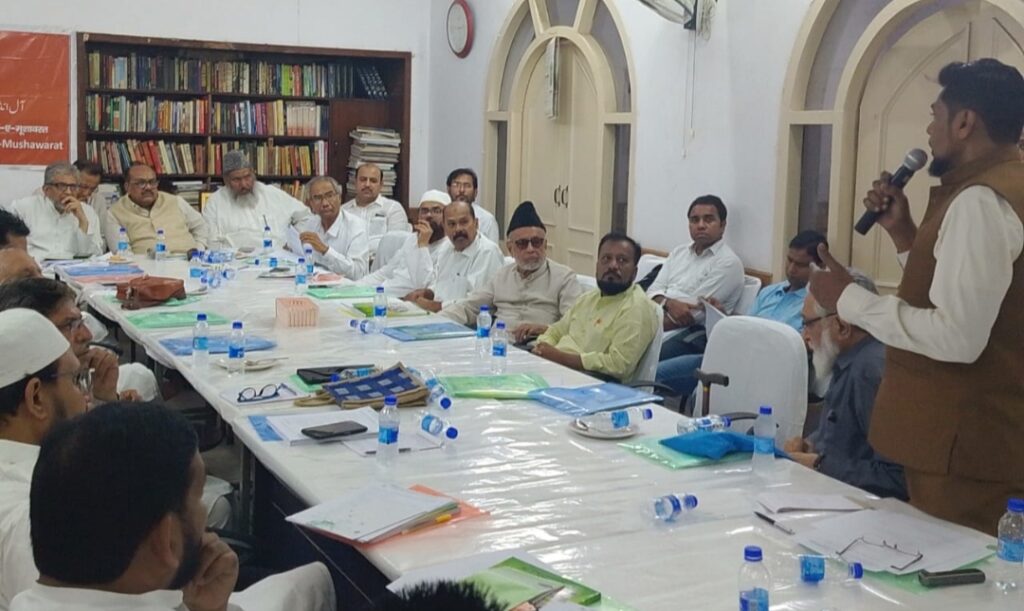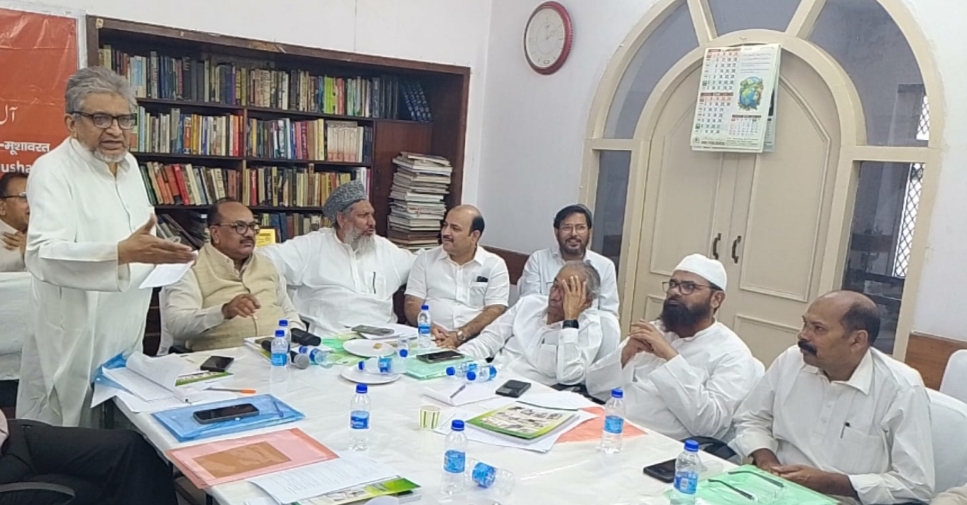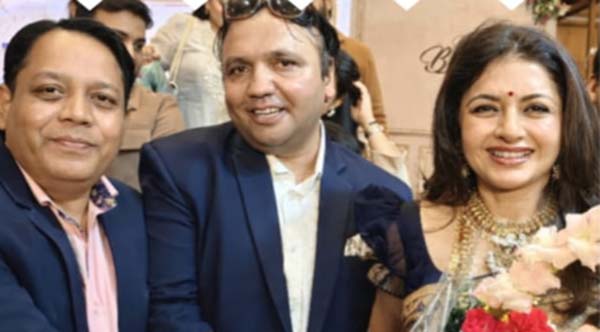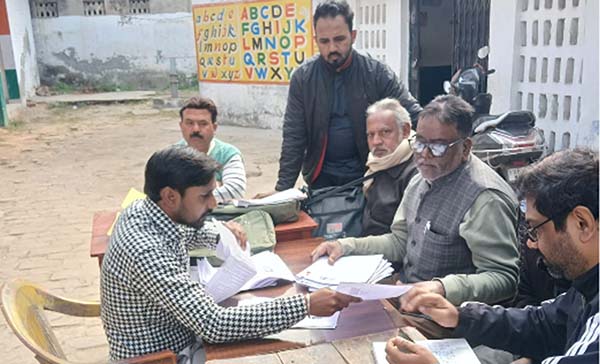New Delhi: The country and the community are facing serious problems, India’s democracy is in danger, there is an atmosphere of fear and terror everywhere, which we have to confront with unwavering confidence and fearlessness. These views were expressed here on Saturday by All India Muslim Majlis e Mushawarat President Mr Feroz Ahmed Advocate in a joint meeting of the executive council and general body of the Mushawarat. He said that our most powerful weapon is the vote, and the situation has reached such a point that now conspiracies are being made to weaken it and even snatch this power from the weaker sections of society. SIR is being used with great boldness to snatch votes.
He said that the oppressed need to unite, sit together and work together. For this, the President of the Mushawarat proposed to convene an all-India convention in late November or early December, while the Vice President of the Mushawarat, Maulana Asghar Ali Imam Mehdi Salafi, said that today this nation is more disorganized and unaware than ever. We need to first train our youth, then take them forward.

Former MP Syed Aziz Pasha said that AIMMM needs to be strengthened and activated everywhere from Kashmir to Kanyakumari, and former M.P. Kunwar Danish Ali emphasized that AIMMM will be implemented with full strength, and we should be ready for every sacrifice. While Prof. Baseer Ahmad Khan emphasized on including representatives of as many parties and every small and big organization, Dr. Anwarul Islam said that the AIMMM should move beyond organizational issues and differences and focus on its original mandate and manifesto.
Mr. Harunnur Rashid (Murshidabad), Muhammad Ahmad Momin (Aurangabad), Abdul Qayyum Khan (Srinagar) and Prof. Aqil Ali Saiyed (Gujarat) proposed to make the consultation active at the grassroots level and present in the media, while Indian Union Muslim League Secretary Mr Muhammad Asif suggested that the AIMMM should also meet political parties and invite their leaders for discussions.
The meeting passed more than a dozen resolutions on issues of the country and the community. Among them were condemnation of the growing trends of communal violence, emphasis on the unity of the oppressed, concern was expressed over the recent violence in Bareilly, targeting of Muslims by the government machinery in Gujarat, Assam, UP, Uttarakhand, Madhya Pradesh, Jharkhand and other BJP ruled states, and a demand was made to compensate the victims for their losses.
The consultation condemned the detention of Ittehad-e-Millat Council President Maulana Taqir Raza Khan and demanded the lifting of all restrictions on his movement. The meeting termed the illegal demolitions and bulldozing of madrassas and mosques and the use of bulldozers against Muslims in Assam, UP, Madhya Pradesh, Uttarakhand and various parts of the country as a violation of the Constitution and law, and similarly, it termed the unjustified actions of the police in Kanpur and Bareilly regarding the “I Love Muhammad” poster as highly reprehensible and intolerable.
These resolutions were presented by the AIMMM’s Vice President Mr Naveed Hamid and the General Secretary Sheikh Manzoor Ahmed, while former Indian Ambassador and AIMMM’s member Prof. Zikr-ur-Rehman presented a resolution on international affairs, shedding light on the Palestinian issue in detail. The meeting unanimously condemned the Israeli aggression and said that the recognition of Palestine as an independent state by 157 of the 197 member countries of the United Nations is a ray of hope. The meeting said that we stand with the oppressed people of Palestine.
The meeting began with the recitation of the verses from Holy Quran by Maulana Azhar Madani. After the opening remarks of the President, Maulana Dr. Muhammad Shees Taimi presented a resolution of condolence for the deceased members of the community and the attendees prayed for their forgiveness. The General Secretary Finance, Mr. Ahmed Raza, presented the budget for 2025-26, which was unanimously approved by the meeting, while the General Secretary (Media) Mr. Ahmed Jawed presented the executive report, which reviewed the performance of the AIMMM for the past one year, covering its efforts, challenges faced by it and its progress.
According the report, the AIMMM has maintained its role as a federation and an umbrella body that has given a common platform to various Muslim organizations, scholars, intellectuals and social workers. Regular contact was maintained with the member organizations so that a common position could be adopted on national and international issues, and efforts were also made to increase contacts with new institutions and connect them with the AIMMM. At the same time, it was also said that limited financial resources are an obstacle to expanding the activities of the AIMMM.
There is a need to establish better relations and coordination between the member organizations. This requires greater attention and resources, especially in view of the ever-changing political and social situation, and because of the growing sectarian hatred, polarization, violent tendencies and the increasing decline of civil liberties in the country pose greater and greater challenges than ever before.
The report emphasized that AIMMM has been based on the instructions of the Quran that “Help one another in deeds of righteousness and piety, and do not be helpers of anyone in sins and transgressions.” And that “Forgive the wrongdoers among you, ask forgiveness for them and consult them, then when you have decided, put your trust in Allah. Indeed, Allah loves those who put their trust in Him.”
The meeting ended with the closing remarks of the President of the AIMMM and the supplication of the Vice President Maulana Asghar Ali Imam Mehdi Salafi. Within other participants of meeting, the President of Delhi Mushawarat Dr. Idrees Qureshi, General Secretary of Maharashtra Mushawarat Mr Muhammad Ahmed Momin (Aurangabad), Convener of Jharkhand Mushawarat Mr. Khurshid Hassan Rumi (Ranchi), Haji Shakeel Ahmed (Jharkhand), Mr. Abrar Ahmed, IRS (Delhi), Prof. Baseer Ahmed Khan (Delhi), Er Sikandar Hayat (Delhi), Abdul Khaliq Ansari (Delhi), Mr Waqar Ahmed (Lucknow), Abdul Qayyum Khan (Srinagar), Maulana Muhammad Salim (Moradabad), Muhammad Aftab Alam (Delhi), Muhammad Murtaza (Delhi), Prof. Aqil Ali Syed (Gujarat) Prof. Abuzar Kamaluddin, President, Mushawarat, Bihar Unit and Prof. Waseem Ahmad Khan (Delhi)’s names are worth mentioning.
Important excerpts from the resolutions passed in the AIMMM meeting: The AIMMM strongly condemns the unjust action of the police against the peaceful protesters in Bareilly. The only slogan of the protesters was “I love Muhammad ﷺ. The police action is a clear violation of their fundamental rights—freedom of religion, freedom of conscience and peaceful assembly.
AIMMM also condemns the detention and arrest of Maulana Tauqir Raza Khan and calls it an insult to a senior religious leader and an attempt to suppress the voice of dissent. The consultation demands that all false and political cases against the peaceful protesters be withdrawn.
All unnecessary restrictions on Maulana Tauqir Raza Khan be lifted and his freedom restored. Clear instructions be given to the police to exercise patience, caution and sensitivity in matters of peaceful demonstrations.
The AIMMM is directed to the National Human Rights Commission (NHRC) and calls upon the Minorities Commission to take sou-moto cognizance of the incident and investigate the alleged misuse of state power in Bareilly. The AIMMM warns that the repeated use of force against peaceful protesters will not only damage the secular and democratic fabric of India but will also set a dangerous precedent in which constitutional freedom will be rendered meaningless.
(2) The AIMMM and all member organisations express disappointment over the interim order of the Supreme Court on Waqf as it has failed to provide full constitutional protection to Waqf institutions.
The AIMMM reiterates its demand that the Waqf Amendment Act be repealed in its entirety, as it violates the fundamental principles of the Constitution and the constitutional rights of minorities. AIMMM demands that the framework of the Waqf Act 1995 (Amendment 2013) be restored, which recognized Waqf by use and balanced institutional powers. AIMMM demands that Waqf Boards be given the same powers of summary eviction as Hindu Temple Boards so that a Once a court order is issued, the occupants can be removed immediately.
AIMMM demands that sections 54 and 55 of the Waqf Act 1995 be made more stringent and effective so that illegal occupants can be removed immediately after a court order. AIMMM further demands that strict laws be made against such persons—be they politicians or government officials—who misuse Waqf properties and bring them to real accountability.
The AIMMM declares that the involvement of non-Muslim members and CEOs weakens the religious identity of Waqf institutions, hence these provisions should be abolished immediately.
The consultation stresses that any legal framework for Waqf should be framed on the basis of Articles 29 and 30 of the Constitution so that minorities can manage their institutions freely. This AIMMM session declares that the struggle for the protection of Waqf is not just about property but also about the protection of religious identity, cultural survival and constitutional rights. AIMMM and all national organizations will continue our peaceful, democratic and legal struggle until the Waqf Amendment Act is completely repealed, and a framework is created that ensures the sanctity, autonomy and survival of Waqf.
(3) The AIMM strongly condemns the unjustified exclusion of legitimate and deserving citizens in the SIR process. Migrant workers, homeless people and poor and illiterate citizens are especially affected by this. We therefore demand that there be an immediate ban on any controversial exclusion of any name from the voter lists.
We demand that the Election Commission and the State Chief Electoral Officers make public all the rules and procedures for exclusion of names from the list. No name should be excluded without written notice and proper objection and grievance procedure. Names unjustly excluded should be restored immediately and the affected voters should be provided with interim voter slips or alternative facilities so that they can vote. We demand that refugee-friendly measures be taken. Mobile registration teams should be deployed in factories, construction sites, markets, railway stations and migrant settlements. Forms should be provided in simple languages and help desks should be set up for illiterate citizens. In case of lack of documents, ration card, employer certificate, school and hospital papers, etc. should also be accepted. The Election Commission should give a clear message to the public that no deserving citizen will be deprived of voting and should launch a public awareness campaign for this.
The AIMMM appeals to political parties, human rights bodies and civil society, they should show solidarity with the poor and vulnerable sections in this matter and make the electoral process free from bias and discrimination.
This general meeting of the Consultative Assembly declares that the true spirit of democracy lies in public participation, not in excluding voters from the lists. The AIMMM Assembly reiterates its resolve that the right to vote of every eligible citizen, especially the migrants, the homeless and the poor and illiterate sections, will be protected at all levels.
(4) The All India Muslim Majlis e Mushawarat (AIMMM) strongly protests the use of bulldozers for punitive operations in Uttar Pradesh and other BJP-ruled states and demands an immediate stop to such operations. Any legal action regarding property disputes or encroachments should follow due process as per established legal principles. We reiterate our demand for the constitution of an independent judicial commission to investigate the legality of past demolitions and the damage caused to innocent citizens. The commission should provide compensation and rehabilitation to the affected families where violations are proven. The AIMMM urges State Governments to ensure that any action relating to property is strictly carried out under the rule of law with due process, fair hearing, and opportunities for appeal. In cases where illegal demolitions have been carried out, affected citizens should be compensated, and efforts should be made to restore or make alternative arrangements for their properties. The Consultation calls for measures to protect marginalized communities from being disproportionately targeted. State Governments should ensure that communal or racial bias does not influence administrative actions.
The AIMMM cannot remain silent in the face of injustices and violations of constitutional rights while adhering to the ideals of national unity and social harmony. The “bulldozer rule” represents a dangerous move towards authoritarianism and totalitarian state power, and it is our collective responsibility to resist such actions that damage the fabric of Indian democracy. We stand firmly with the victims of these demolitions and demand justice. Let us work for a future where every citizen, regardless of religion or background, can live with dignity, protection, and equality before the law.
Released by: Ahmed Jawed.
General Secretary, AIMMM.



